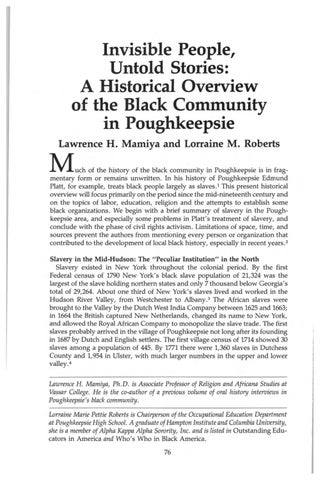Invisible People, Untold Stories: A Historical Overview of the Black Community in Poughkeepsie Lawrence H. Mamiya and Lorraine M. Roberts
M
uch of the history of the black community in Poughkeepsie is in fragmentary form or remains unwritten. In his history of Poughkeepsie Edmund Platt, for example, treats black people largely as slaves.' This present historical overview will focus primarily on the period since the mid-nineteenth century and on the topics of labor, education, religion and the attempts to establish some black organizations. We begin with a brief summary of slavery in the Poughkeepsie area, and especially some problems in Platt's treatment of slavery, and conclude with the phase of civil rights activism. Limitations of space, time, and sources prevent the authors from mentioning every person or organization that contributed to the development of local black history, especially in recent years.2
Slavery in the Mid-Hudson: The "Peculiar Institution" in the North Slavery existed in New York throughout the colonial period. By the first Federal census of 1790 New York's black slave population of 21,324 was the largest of the slave holding northern states and only 7 thousand below Georgia's total of 29,264. About one third of New York's slaves lived and worked in the Hudson River Valley, from Westchester to Albany.3 The African slaves were brought to the Valley by the Dutch West India Company between 1625 and 1663; in 1664 the British captured New Netherlands, changed its name to New York, and allowed the Royal African Company to monopolize the slave trade. The first slaves probably arrived in the village of Poughkeepsie not long after its founding in 1687 by Dutch and English settlers. The first village census of 1714 showed 30 slaves among a population of 445. By 1771 there were 1,360 slaves in Dutchess County and 1,954 in Ulster, with much larger numbers in the upper and lower valley.4 Lawrence H. Mamiya, Ph.D. is Associate Professor of Religion and Africana Studies at Vassar College. He is the co-author of a previous volume of oral history interviews in Poughkeepsie's black community. Lorraine Marie Pettie Roberts is Chairperson of the Occupational Education Department at Poughkeepsie High School. A graduate of Hampton Institute and Columbia University, she is a member of Alpha Kappa Alpha Sorority, Inc. and is listed in Outstanding Educators in America and Who's Who in Black America. 76









